- Home
- M G Vassanji
What You Are Page 12
What You Are Read online
Page 12
“Takes you in his arms? Not everyone can love us back. We sometimes love impossible people when we are young. Actors. Do you know how many girls your age love Elvis? Scream for him? Pull out their hair—you don’t do that, do you? Paul McCartney? There, you see. You are just like many girls. Just don’t take it too seriously, think of other things. Do you like to read novels?”
“No.”
“Listen to music?”
“Yes.”
“Well, when you get these feelings, listen to music. Sing. You have a brother and sister, yes?—play with them. Tell jokes to each other. Parents make a good subject—they can be funny, yes? And then come and see me in two weeks—understand? Two weeks—and tell me how it went. You can tell me anything you want. Anything you say will be in confidence—no one else will know. Not even your mother and father. Understand?”
The girl.
When the swami comes the drum will resound,
lights will glitter in all the directions
to welcome him.
How do we fall at his feet?
His lover broke her chain of pearls
and went down on her knees to pick them up.
* * *
—
“Thank him, he’s back. Now listen, daughter. Don’t look him in the eye. Never look the lord in the eye. His power can affect you. Just bow your head before him, keep saying the prayer in your mind, and let him put his hand on your back and bless you. Say Amen. And then walk on but not showing your back to him. Can you do it? And then your problem will go away. Forget all those charlatans.”
But I met his eyes and he understood. I met his eyes and he smiled. His look said I love you in return. It’s just that I am busy and tied up and they don’t leave me alone. I am needed by everyone. They all love me. I met his eyes.
* * *
—
2. MANHATTAN, NEW YORK.
The girl.
“Hey, baby, want to have a good time?”
She hurries on.
“Hey, where you from? India? Hare Rama? You want to see America? I can show you. All right, you don’t want to go away. Like the Big Apple, hey?…Listen, baby. You want to make quick cash? Moolah, mucho moolah. You understand?”
“You’re hurting me!”
“Hey, leave her alone. Here, can I take you home? I won’t hurt you. Where do you live?…Twenty-Sixth. And? Lexington. All right—here—get into this cab. Driver, Twenty-Sixth and Lex. Bye, Miss. You should be careful of strangers. This is New York.”
George.
She sees him a few days later on Third Avenue.
“Hi, Miss—remember me? On Seventh?—Outside Macy’s? I put you in a cab.”
It takes her a moment to recall. “Yes…”
“My name is George, I live on Twenty-Eighth Street. I guess we are neighbours! I was going for coffee—would you like to have coffee?”
“Yes,” she says, and it just so happens that she runs into him every so often. They become friends. Her first friend in America. And they talk.
“I’m looking for a job, you know.”
“Yes, New York’s expensive. What brought you to New York? Student?”
“No, tourist.”
“You must be very adventurous!”
“I just walked into here,” she says.
“What do you mean, you walked into here? To New York!”
“I came at the airport, they stopped me, told me to wait. They took my passport.”
“You had a visa?”
“Yes, but still. The man was rude. He didn’t believe me that I was a tourist.”
“And?”
“He went away to talk to someone, and I just walked out. I left and nobody stopped me.”
“You entered illegally.”
“Yes. I think so. Is that bad?”
“No, I don’t think so.”
“And now I have no passport.”
He helped her get a job at a cousin’s bath and kitchen shop on Forty-Eighth. He took her to an immigration lawyer way up on 113th. She made a few friends at work. She became a New Yorker.
“I like you a lot,” says George one day, in her apartment. He’s carried her groceries. “I guess you know that. You are very attractive. And gentle, not like these American girls, all pushy.”
“I like you too, George.”
“I think we make a good couple,” he says. “I guess we’ve never been quite…intimate. Can we try?”
He leans forward and as she cringes inside he kisses her delicately on a cheek and she blushes deeply. Her heart beats so fast she thinks she’s having a heart attack. A man touching her. But it didn’t feel bad. It takes a few days before he tries to land a kiss on her lips. She pulls away.
“I can’t, George.”
He withdraws.
“I’m sorry. I didn’t mean to upset you.” She smiles her thanks.
“I guess you don’t like me that way…”
“I like you, George, but.”
“There’s someone you’ve left behind? Someone there?”
She doesn’t reply at first, then whispers yes.
“That’s fine, then we’ll still be friends. Okay?”
“Thanks George.”
The girl.
There’s no one anywhere but you, my lord. I depend on you to preserve me, just as you came to Draupadi’s aid when she called your name…
But he’s no devil, George is a saint, just so you know, and he keeps me company, without making demands, no need to get jealous! I have no one else here, nobody to talk to, except George. There have been attacks on women recently, and he calls to check on me. He even comes with me to the Indian restaurant on Lexington, sometimes, but poor fellow, he can’t tolerate the spices and eats only rice and yogurt. Even there, the men gawk at me. George noticed, warned me to be careful not to be followed. One day we went to the top of the Empire State Building, and it was wonderful!—but you couldn’t see too far because of the smog. It’s not the tallest building anymore, he told me, there are two new ones on the other side of the city, and we could just see them, as shadowy, ghostly figures.
The girl and her sister.
“Thank God you are here. I don’t know what I would have done. It gets so lonely sometimes. Sundays, especially.” How many Sundays has she cried herself to sleep, but she doesn’t tell her sister that. “But I’ve become quite the New Yorker. Here you walk fast, did you notice that? It’s automatic, you just do it!…Did they stop you at Immigration?”
“No, I said I had come to see my sister, and they let me in.”
“You have your passport, then.”
“Yes, I have my passport. How come you lost yours?”
“Long story. Real adventure.”
“What’s the apartment like?”
“All right. But cockroaches, you have to help me get rid of them.”
“Cockroaches? In New York? Are you serious?”
“Yes. Now first thing, you have to find a job. Then we go to this lawyer who can help us…Tell me, how are Ma and Bapa?”
“They are well. And happy you are settling and have a job. You sound like a real American in your letters! Every day they give thanks to God. And I do too. But who’s this George? We are all curious! I thought our parents would have a fit when you wrote about him, but they didn’t mind. They want you to be happy. They always favoured you.”
“Don’t be silly. Yes, he was a nice guy I met accidentally. He was very nice to me, he found me the job and the lawyer who’s doing our green cards…”
“And?”
“He had to go to Puerto Rico to take over his father’s business…they have a factory there…”
“And?—you let him go?”
They walk in silence.
“I made a mistake, I know.”
<
br /> Her sister says nothing.
“I just couldn’t…I liked him but I couldn’t. I would like to go to California. The weather is better and there’s the sea. I heard it’s nice. Not so dirty like New York.”
The scholar.
“In our sacred songs,” I explained to her, “the singer takes on the persona of a woman, a lover, even when he’s a man. But he’s a lover of God. That is a well-known trope in mystical literature. The devotee as the female lover.”
“And women?” she asked, a little aggressively.
“Women too, though somehow that seems normal. Some of the songs are intensely longing and very sensuous.”
She stared at me. Of course she knew all that, I was just carried away and showing off. I smiled at her.
“My sister liked to sing them. She had a lovely voice.”
“Really? I’m sure you sing well too.”
“But she was exceptional. She sang whenever she could.”
Her tone had fallen, and I didn’t know what to say.
“But she took it literally—this lover bit. She thought she was a real lover of our lord—who is very handsome, as you know. She could not separate her reality from this trope, as you call it. She became depressed. It was hard to see her like that. She couldn’t control herself.”
Her voice drifted and she looked away. In an afterthought, she picked up her handbag and brought out from it a snapshot to show to me. The girl in the picture was fair and not very tall, with long hair and a plain face that was strikingly beautiful.
“Where is she now?” I asked softly.
She didn’t answer for some moments, then: “She went to Santa Monica in California. Stayed there for two years.”
“And where did she go from there?”
“She found her lord at last…she drowned herself at high tide.”
“Don’t cry, please…she’s found her peace.”
But that story has haunted me since. I can’t forget it, and that face, I can’t quite explain why. I thought that one day I’d write about it.
The girl.
Speak sweet words, softly…the lord is the Ganges in which you drown. In her heart he resides forever, and she cannot sleep or stay awake…
* * *
—
My lord, one day I became afraid. I was older and not so good-looking. I had to extract a tooth. And you remained radiant and handsome as ever. How your face shone in your new photos. But more and more you ignored me. Once, you had looked into my eyes and showed you understood my agony of love. You were helpless, you said. But now you’re married to a most beautiful European model, what could I be to you? I will no longer haunt your dreams nor you mine.
THE KING OF COTTON
My grandfather adores me. “Why do you love me so much, Dada?” I inquire, braking to a stop before him, putting my hands on his knees. His twinkling face breaks into a barely audible laugh that squeaks out like a loose spring inside his throat. He tickles my chin. “Wait till you make children of your own,” he says. “There’s nothing like it.”
He looks around for confirmation, sees my dadi, who exchanges a look with him but says not a word.
“I don’t want children or grandchildren, Dada!”
“You will.”
What I would have liked is a father.
As I back off and run away our eyes avoid each other’s that instant, except for a tiny flash from one corner of my eye to a corner in his. There’s an understanding. An accusation and a terrible admission.
He sits back, his eyes following me.
That large oval head, those few white wisps of hair like a feathery, tentative halo on its gleaming top. His beautiful face, that’s how it’s always been for me, ageing minutely, always smooth, just a little older with the years. Unlike Dadi, with her ashen face and head like an old cardboard box weathered and dented by the years, a far cry from the blushing bride of their wedding photo.
The doting Dada of my childhood I’ve come to think of as my father’s murderer. I don’t believe in the supernatural, and perhaps it’s his own guilt that informed my indictment the years I knew him. He had never forgiven himself, I know, nor did anyone else, this man the fruits of whose once-ruthless enterprise in Africa we now live on in Canada like maggots on dead flesh, who sat flicking the remote control morning till night, willing death to come from some channel, only it wouldn’t. But when it came finally, it was to everyone’s relief.
* * *
—
The family, like many others, had come penniless from India to East Africa in the early 1900s. Through their business acumen, imprinted on their Gujarati genes, so we believe, they managed to lift themselves up in the alien country and make it home. Three meals a day and no debtors knocking at the door with their collection books; comfortable, no more than that, but only a few such pioneers could boast that luxury. Dada inherited the family business, distributing potatoes, onions, and various grains. Not glamorous, and I understand that the shop stank up the street in the rainy season so that people sometimes were forced to take an alternative route. But a steady enterprise, nonetheless. It could have gone on for decades more. But one day fortune came his way, as it did the Canadian who looked under his tire when he was stuck on a muddy road somewhere in the interior of the country and saw a diamond. Thus began the Williamson Diamond Mines. This part of our story we proudly discuss, embellish, and throw around. How do you know when opportunity is looking you in the face? You know, if you’re my dada. He knew how to look, as did Mr. Williamson.
Dada was obsessed with news, anything that was happening, anywhere in the world. War and peace, famine and abundance, royal weddings and births. The daily paper reached him at five every morning. Later, on his midmorning break from office, before chai and bhajias at the K T shop, he would saunter in at the Indian reading room and peruse newspapers from around the world. Even if they were weeks late. Knowledge gained, instinct sharpened. At the chai shop later, discussion and argument on all the news that had been fit to see print, plus the previous night’s BBC broadcast. All talk about elsewhere, nothing much happened in that backwater. The War in Europe had no impact, except for a few shortages of imported items. Some speculation in property went on; a little gambling and drinking, though forbidden; fornication. When the War ended, the price of sisal, which was used to make sacking and rope, suddenly dropped. The Germans and Greeks who had owned the sisal farms, the Germans having brought the crop to the country in the first place during their rule, started leaving, tired, elderly, and bankrupt. Defeated. Dada, my family says, had already seen in the newspapers the portents of another war, and so he and his friends bought up the abandoned sisal properties at dirt-cheap prices. And sure enough, the Korean War began, and sisal shot up again. Fortunes were made.
They lived like kings thenceforth. Bungalows by the sea, servants, exotic foods, when the rest of their Indian community still lived in shacks with holes for toilets. They travelled abroad, acquired a polished veneer, their children went to study abroad and came home speaking English like the English. A new social class formed. Sisal eventually fell when nylon came around, but by then they were ready to walk away from it. Dada was into cotton, Suleman Rawji and Sons importing it from America and India with a monopoly. You want raw cotton—Marikani—from America, you go to Suleman Rawji. You want to stock the khanga wraparound, weaved and printed in India with the latest brilliant African designs and catchy Swahili proverbs, Suleman is your man. The monument to his success was the art deco building at the bustling corner of Market and Mosque streets, five floors high with a dozen shops and fifty apartments. Suleman Rawji Building, the biggest one in town, only to be nationalized in less than two decades by a socialist government.
* * *
—
He sits, this former king in economic exile, in a house in North Vancouver, on his La-Z-Boy in his pyjamas all day, the Indi
an way. Hoping, I suppose, that one of his grandchildren will visit today. He arrives at a news channel, watches a few minutes, pauses at a soccer match, then quickly heads on, past CNN, Fox, and local Punjabi, and rests a moment longer at NDTV from Delhi. Nothing holds him. He takes a nap, gently snores. He used to drive, but now can’t, due to recurring gout. He takes a taxi sometimes to go to a community function or the Safari chai shop, which is the news and nostalgia exchange, where former cricket players from Dar come to recall their best innings, and visitors from Toronto are welcomed and mocked: do you have such chai, such kababs and bhajias in your city? Most of the time he sits at home flipping channels. His time is past, his money given away to his two sons, two daughters, and one widowed daughter-in-law, my mother.
* * *
—
One late afternoon—I must assume it was Sunday, though Dadi will not confirm—there was a garden party on the grounds of their Oyster Bay mansion in Dar es Salaam, at which several VIPs, including the British governor of the territory, Sir Edward Twining, and the colonial secretary, Iain Macleod, on a tour from London, were present. Between these two eminences stood the cotton king displaying his charm, while a pleasant, sophisticated murmur proceeded in the background. Suddenly a commotion was heard at the gate. Sporadic recriminations and exclamations of protest approached the party, and the guests saw an old woman in rags in the tight clutches of two watchmen, who were dragging her forward. When she was close enough, she broke loose and hurled herself through the guests and ran up straight to Suleman Rawji. A hush fell, as the woman raised her hands before the king of cotton in a gesture of prayer. Please.
“My son is dead and waiting to be buried, I cannot find a cotton sheet to wrap him in. Help me! Msada, mfalme wangu! Tafadhali, Sulemani. Two yards of Marikani is all I need!”
In his arrogance, bloated by the presence of two white men of the British government at his side, Suleman Rawji asked her angrily to repeat her request, then told her with contempt, “Mama, if you don’t have money to buy two yards of cotton, use grass to shroud your son! How dare you disturb me here in my home? Go away.”

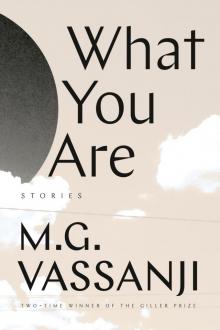 What You Are
What You Are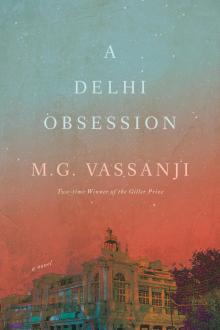 A Delhi Obsession
A Delhi Obsession When She Was Queen
When She Was Queen No New Land
No New Land Nostalgia
Nostalgia Mordecai Richler
Mordecai Richler The Book of Secrets
The Book of Secrets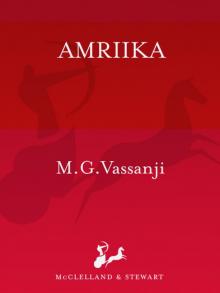 Amriika
Amriika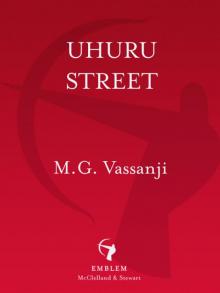 Uhuru Street
Uhuru Street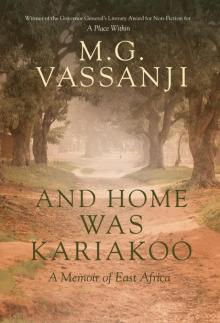 And Home Was Kariakoo
And Home Was Kariakoo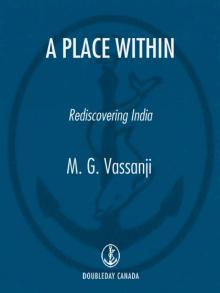 A Place Within
A Place Within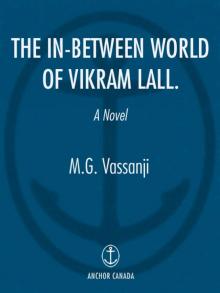 The In-Between World of Vikram Lall
The In-Between World of Vikram Lall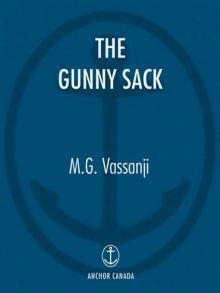 The Gunny Sack
The Gunny Sack